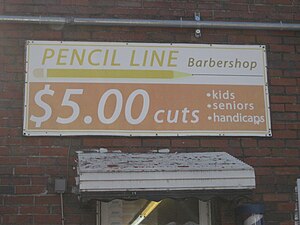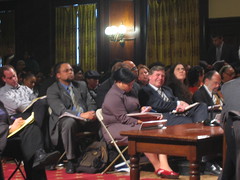Maybe I wasn't looking in the right place. I was expecting that the severe downturn in the economy would cause a movement to permit school districts to argue that expense or cost should be a defense in special education cases. I even ran a poll in this blog to that effect. The result was a resounding no. But as many readers have suggested, perhaps the effects of the
recession have been more subtle. Maybe they are silently creeping into the decision making process in ways that are difficult to observe, let alone quantify. Subtlety isn't really my thing, but I think that these effects are likely present.
I have just discovered another insidious effect of the bad economy. It involves a state due process system. I admit that I have a bias here. (By the way check out the new disclosure on the lefthand side of the blog!) As many of you know, I am a hearing officer and I train hearing officers. I don't think this invalidates my opinion, but disclosure is good.
The due process hearing system is extremely important. It is at the heart of the system of procedural safeguards established by IDEA to protect the rights of children with a disability. The importance of procedural safeguards has been recognized by the
U. S. Supreme Court in
Shaffer v. Weast 546 U.S. 49, 126 S.Ct. 528, 44 IDELR 150 (2005) as the mechanism that levels the playing field in view of the information advantages enjoyed by a school district.
Indeed, there is almost always no other trial in a special education dispute. The decision of a hearing officer is appealable to court (or in some states to a second tier review officer). The doctrine of exhaustion of administrative remedies, however, requires that for almost all special ed disputes, the matter must first be heard by a hearing officer, and that the final administrative decision determines the matter in the absence of an appeal.
As readers of this blog know, we have done many previous posts on the hearing system. (These are available through the search bar on the lefthand side of the blog.) Every state system is different. Two states have a three person panel conduct the hearing. Many states require that hearing officers be lawyers; some do not. Some states contract with hearing officers. Some use the ALJs of the central panel. Some have a special section of the ALJ panel for special education cases. The vast majority of stats provide high quality training for their hearing officers; some states are not so diligent in this regard. (Remember again my bias here.) The 2004 amendments to IDEA require new levels of competence and training for hearing officers. Apparently, Congress was concerned about the due process hearing system.
I just learned of a big economic effect upon the due process hearing system in the state of California. The due process hearings there are heard by Administrative Law Judges on the central panel. They have a good bunch of people. I was one of the trainers at their annual training last March, and I have met some of them at other conferences and meetings. But the California economy is in big trouble. State employees have been required to have the state budget balanced on their backs. This includes the special education ALJs.
Specifically the special education ALJs are furloughed (that's HR talk for laid off) the first three Fridays of the month. That's a 13.9% pay cut. This despite a work load. that remains t
 Image by Getty Images via Daylife
Image by Getty Images via Daylife
he same I find this type of red tape bureaucratic nonsense to be offensive. Does the California government think that these changes do not affect the quality of justice? Do they care?
I understand that times are tough, but how can these "furloughs" be justified. The ALJs have to be highly trained in special education law and in the nuts and bolts of running an administrative hearing. It ain't easy; I've been there. Won't these drastic actions affect the quality of the California due process system? If the procedural safeguards like due process hearings are at the heart of the balance between school districts and parents, how can this cheapness serve any important public policy. As they say during the hearing, I OBJECT.
 Image via Wikipedia
Image via Wikipedia



![Reblog this post [with Zemanta]](http://img.zemanta.com/reblog_e.png?x-id=6f2bcaaf-e967-4ae5-a16c-ac9983b1645f)



![Reblog this post [with Zemanta]](http://img.zemanta.com/reblog_e.png?x-id=672d984c-30c8-4c7a-9ecf-bdfd91e6cbbb)
